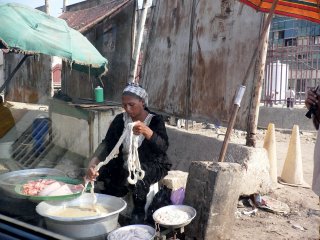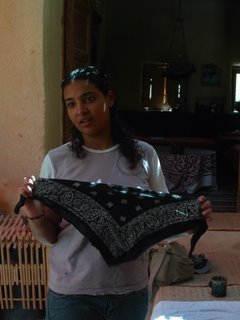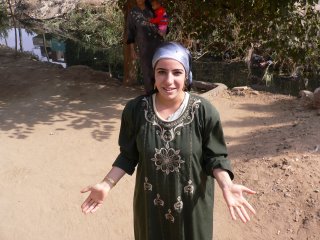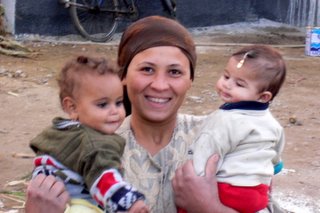I find myself very subdued these days, and not simply from the aftereffects of the ubiquitous flu virus that has apparently engulfed most of the world. Being forced to "take it easy" and to stay indoors for a while to get rid of the pernicious bug, I've had more time to read the news online and think about things that are going on in the world. This is not very cheering. I was horrified to read of the bombing outside the church in Alexandria just before the Coptic Christmas. There have been incidences of violence before that have had aspects of religious issues, but the idea that a suicide bomber might want to target a church was never really considered by anyone, I suspect. News that Muslims went to the churches at Christmas to show solidarity and in hopes of deterring further violence helped quite a bit to restore my sense of the Egypt that I have always loved.
But the problem of religious divisions is not new and it isn't going away any time soon. Various members of the Egyptian community have been thinking, speaking and writing about what is ailing our country in this regard. A blog on Arabic literature summarized the thoughts of Egyptian writers on the topic, and Global Voices posted a translation of an Egypian blogger's thoughts on the subject. He notes that he is soon to become a father and vows that his son will not grow up in a country with the same issues of distrust between Muslims and Christians. BikyaMasr posted a report of governmental and society support for the Christian community, but notes that many issues of contention are not likely to be addressed or solved any time soon.
With the recent shooting of a US Congresswoman and a judge, among others, in Tucson, Arizona, discussions of who and what is to blame for such an action have flown over the internet. I find myself seeing far too many similarities between the founding issues of the killings in the US and in Egypt in the use of language. Keith Olbermann on MSNBC called everyone in the US to task for the ease with which people use words and images of violence in political discussion these days, the prevailing culture of violence expressed on television shows, in the news media, and even in games for children. I've never been one for strict prohibition of games with guns (especially when having refused to buy them for my son, I found him "shooting" one of his buddies with a sneaker as a four year old) and I don't think that my kids' fondness for shooting zombies on an XBox during their odd bit of free time has made them into potential mass murderers. But I do have to wonder about the current fondness for zombies, vampires and other ordinarily rather frightening topics as entertainment on television. A bit of a thrill is one thing but hour after hour of being chased by the undead week after week....am I the only one who finds this a bit odd? I'm highly relieved to note that the previously mentioned offspring prefer such things as Dr. Who.
I had a lovely Coptic family here at the farm last week. They had come from Australia, Germany, and the US for a famly reunion in Egypt. As one might expect among a group of sixty-somethings, conversation naturally ran to comparisons of the Egypt that they had left about the same time I moved here and the Egypt of today. While there were things that we could agree on that seemed to be improvements, discussion of the recent bombing found us all agreeing that there was a greatly heightened sense of differences among Egyptian communities and extremist stances than we had been accustomed to in the past. But, then again, we all agreed that we noticed this in communities in other parts of the world. I found myself realising that I simply didn't categorise my friends by their religious beliefs or affiliations. For me, it isn't relevant information, and my guests noted that this had been the case in their relationships in Egypt before they left. They were quite saddened to think that it had become relevant for people.
Five years ago I wrote about Dr. Leila Ahmed's autobiography, A Border Passage, in my blog. Aside from it being a marvelous book, I was struck by the difference in Egyptian society that she described before and after Nasser's revolution in Egypt. Many people I've spoken to have commented on the multilingual, multinational, multireligious nature of the old Egypt. Could some of the changes be due to the introduction of new words that were brought in to describe this country and the concepts that they suggested? During Nasser's rule, the name of Egypt (at least in English) was changed to The Arab Republic of Egypt (after the United Arab Republic of Egypt, Syria, and Libya sort of fell apart). I find the term "Arab Republic of Egypt" to be something of a conundrum. In the first place, Egyptians aren't Arabs. They never have been and probably never will be. They are Arabic speaking natives of North Africa...not the same. They are Egyptians. And then you have that magic word "Republic"....that sort of still remains to be seen. But by using words like "Arab Republic", my sense is that it makes a fertile ground for some divisive qualifications to be made. It's sort of a chicken and egg question, I guess and I don't pretend to have any brilliant answers, only questions.
I honestly don't know if we can roll back the violence of language to stem the violence of action. I hope that we can. I think that the world now is too complex for most of us to comprehend in its entirety, but at the same time seems often to be so small as to be encroaching on our back porches. Finally, I suspect that our Egyptian blogger has the right idea. We must each do the best that we can to make our part of the world right for our children and our neighbours. Speak softly and with love.
copyright 2011 Maryanne Stroud Gabbani
Egypt isn't what it appears to be in the media...but that's no real surprise, since not much is. I moved here in the late 80's from Toronto, Canada, with my Canadian/Egyptian husband, my son and my daughter. The children adapted quickly and we decided that this country was a good place to live. Now I wouldn't change my home for anything.
Showing posts with label A Border Passage. Show all posts
Showing posts with label A Border Passage. Show all posts
Monday, January 10, 2011
Wednesday, October 20, 2010
Women Writing; Women Reading

Arab women get a bum rap to my way of thinking. The stereotype is a silent acquiescing figure wrapped in black just waiting for her master's voice, but as I've been happy and eager to tell friends abroad, that is so not the reality. I'm not saying that life for women in the Middle East is all sunshine and lollipops, but I am saying that women are not the doormats that they are imagined to be either. Just recently, I followed a lead from one of my favourite bloggers about Arabic literature in translation, M. Lynx Qualey, who writes (appropriately enough) Arab Literature (in English) on Wordpress, to a site Arab Women Writers. This site contains biographical information and references to Arab women who live all over the world (including the United States) and who write in a variety of languages. I consider myself fairly well-versed in Arabic literature, at least in translation, and I was awe-struck by the extent of the list of writers catalogued on the site.

My enlightenment regarding the role of Arab women first came courtesy of my mother-in-law, God rest her soul, who was a force to be reckoned with. She never stood in the limelight, but she certainly directed the lighting crew and everything else. No one, but no one, crossed her. Once I moved here, my education continued. I met women who were working at the highest levels of business and banking, women like Iman Bibars the director of the Association for the Development and Enhancement of Women,Noura el Daly who runs Animal Haven and many others who completely ignored the stereotype and were working hard to change it.
.

For those of us who can't just hop a plane to travel to wonderful new places to see and learn, books offer us the chance to visit and learn from our living rooms, even more so, I feel, than films and news. Books about women are terrific- but when they are written BY women they are the unique voices of experience. I've written before about Dr. Leila Ahmed's book, A Border Passage, which remains one of my favourite books and one that gives a unique picture of Egypt in the days before Nasser. Lucette Lagnado, who left Egypt with her family for the US as a child, wrote the wonderful Man In The White Sharkskin Suit, which gives insight into the lives of the Jewish Egyptian families prior to the Nasserist diaspora. Through the eyes of these women we can move in time and space, gaining wisdom from our sisters all over the globe.

As an added bonus, I'd like to recommend Nahla Hanno's blog Born Again Egyptian, which she writes in both English and Arabic. Unfortunately, I can't read Arabic so I have to be satisfied by the English posts, but they are more than satisfying. She's living in Saudi Arabia and writes about her experiences at home and abroad and about her love of Arab women's writing. A marvelous post titled Both Right And Left Handed talks about a book by a Syrian woman who interviewed women throughout the Arab world about their lives. She found food for thought and hope among the Tuareg women of North Africa. And who knows who we will discover tomorrow...
copyright 2010 Maryanne Stroud Gabbani
Sunday, December 11, 2005
Definitely Book Of The Month

I stopped by Diwan, a lovely bookstore in Zamalek, the other day when I ventured into town for some reason that I've already forgotten. Stopping at Diwan is like stopping at a chocolate factory for me. I am a serious book addict with a fairly serious library of books by and about Egyptians and Egypt. My visitors love it because they can read to their hearts content about pyramids, Mamelukes, early exploration of the Nile, whatever. Anyway, I found myself poking through the shelves and I ran across a book by Dr. Leila Ahmed, the first professor of Women's Studies at Harvard Divinity School. The book, A Border Passage, is her autobiography and reminiscences of her childhood in Cairo during the change from British rule to Nasser's government. To be quite blunt, it is one of the best books I've read in years.
 Dr. Ahmed has also written Women and Gender in Islam: Historical Roots of a Modern Debate, a book that I haven't read yet, although it is now on my list. A Border Passage is lyrical, with the music of Egyptian life a theme that flows comfortably and seductively throughout her autobiography, which explores many of the issues of growing up female in Egypt. Some of the issues faced in growing up during the 50's and 60's have changed for women in Egypt, but many of them are the same. Watching my own daughter identify and deal with them as she grew up here was both interesting to me and daunting at the same time. With a Canadian mother and an Egyptian father, she had to invent her own culture as she grew up, since the two didn't always synch well. My husband was a product of the same culture as Dr. Ahmed, a culture that did value males over females, and that allowed males more freedom of action than females had. On the other hand, I was raised by a father who felt that it was important for both the boys and girls to know how to cook, sew, change tires on a car, fix a broken toilet, pitch a tent, and catch a fish. Although I made it clear from day one that there would be no difference between the rights of our son and our daughter, this was a point that had to be brought home more than once. Leila Ahmed's family was both ordinary and extraordinary and made it possible for her to study abroad at a time that such a course was not so common for young women.
Dr. Ahmed has also written Women and Gender in Islam: Historical Roots of a Modern Debate, a book that I haven't read yet, although it is now on my list. A Border Passage is lyrical, with the music of Egyptian life a theme that flows comfortably and seductively throughout her autobiography, which explores many of the issues of growing up female in Egypt. Some of the issues faced in growing up during the 50's and 60's have changed for women in Egypt, but many of them are the same. Watching my own daughter identify and deal with them as she grew up here was both interesting to me and daunting at the same time. With a Canadian mother and an Egyptian father, she had to invent her own culture as she grew up, since the two didn't always synch well. My husband was a product of the same culture as Dr. Ahmed, a culture that did value males over females, and that allowed males more freedom of action than females had. On the other hand, I was raised by a father who felt that it was important for both the boys and girls to know how to cook, sew, change tires on a car, fix a broken toilet, pitch a tent, and catch a fish. Although I made it clear from day one that there would be no difference between the rights of our son and our daughter, this was a point that had to be brought home more than once. Leila Ahmed's family was both ordinary and extraordinary and made it possible for her to study abroad at a time that such a course was not so common for young women. I spend a lot of time with women of many backgrounds and social classes. My seventeen year old housekeeper from the village can't read or write, and her mother died about five years ago followed shortly by her father, leaving her an orphan. She's now engaged to be married to a young man from a neighbouring village, a skilled groom working for friends of mine. Before she became engaged to Gaber, she asked my advice as to his suitability. Gaber is a polite, hard-working young man with whom I could see no problems, so my advice was that he would probably make a good husband. Although my heart cringes at the thought of a seventeen year old getting married, she's already been supporting herself for the past three years and is well past the usual age of marriage in the villages. When she marries, she will stop working for me, but has promised to arrange for a friend of hers to come to help out in my house. Her friend is also married but also has children and I suppose has realised the necessity of extra income in her family.
I spend a lot of time with women of many backgrounds and social classes. My seventeen year old housekeeper from the village can't read or write, and her mother died about five years ago followed shortly by her father, leaving her an orphan. She's now engaged to be married to a young man from a neighbouring village, a skilled groom working for friends of mine. Before she became engaged to Gaber, she asked my advice as to his suitability. Gaber is a polite, hard-working young man with whom I could see no problems, so my advice was that he would probably make a good husband. Although my heart cringes at the thought of a seventeen year old getting married, she's already been supporting herself for the past three years and is well past the usual age of marriage in the villages. When she marries, she will stop working for me, but has promised to arrange for a friend of hers to come to help out in my house. Her friend is also married but also has children and I suppose has realised the necessity of extra income in her family. Every woman has a story. We will recognise ourselves in parts of the story and find new truths in other parts. We will enrich our own lives by learning of the lives of others. A Border Crossing is a double blessing. Not only does it give us an experience of another culture, another country, and another time, but it does so with such beauty and grace that you will dread finishing the book as I do.
Every woman has a story. We will recognise ourselves in parts of the story and find new truths in other parts. We will enrich our own lives by learning of the lives of others. A Border Crossing is a double blessing. Not only does it give us an experience of another culture, another country, and another time, but it does so with such beauty and grace that you will dread finishing the book as I do.
Subscribe to:
Posts (Atom)